22 oct 2015
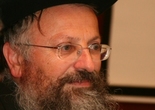
"It is prohibited to keep the Palestinian alive after the operation, because if he is left alive, there is a fear that he would be released and then he would kill others," Eliyahu wrote on Facebook.
Israeli Jewish Rabbis have declared the killing of Palestinian resistance fighters “a religious duty”, Israeli media has reported.
Israeli news website Walla reported that right-wing rabbis recently replied to questions including: “Am I allowed to kick the insurgent, hit him or shoot him in order to kill him after he has been arrested or is this prohibited?”
Rabbi Rav Benzion Mutzafi: “It is not only desirable to do so, but it is a religious duty that you hold his head down to the ground and hit him until his last breath.”
Mutzafi reportedly expressed anger towards Rabbi David Staph’s response. Staph said it is prohibited for people to attack a Palestinian perpetrator of an operation after he has been injured or when he is posing no danger.
Mutzafi: “Do not listen to Staph because those who have mercy on the cruel will end up being cruel toward the righteous.”
Chief Rabbi of the city of Safed, Shmuel Eliyahu, called for all Israeli police officers and soldiers who allow Palestinian resistance fighters to live after their arrest:
“It is prohibited to keep the vandal alive after the operation, because if he is left alive, there is a fear that he would be released and then he would kill others,” Eliyahu wrote on Facebook.
Israeli Jewish Rabbis have declared the killing of Palestinian resistance fighters “a religious duty”, Israeli media has reported.
Israeli news website Walla reported that right-wing rabbis recently replied to questions including: “Am I allowed to kick the insurgent, hit him or shoot him in order to kill him after he has been arrested or is this prohibited?”
Rabbi Rav Benzion Mutzafi: “It is not only desirable to do so, but it is a religious duty that you hold his head down to the ground and hit him until his last breath.”
Mutzafi reportedly expressed anger towards Rabbi David Staph’s response. Staph said it is prohibited for people to attack a Palestinian perpetrator of an operation after he has been injured or when he is posing no danger.
Mutzafi: “Do not listen to Staph because those who have mercy on the cruel will end up being cruel toward the righteous.”
Chief Rabbi of the city of Safed, Shmuel Eliyahu, called for all Israeli police officers and soldiers who allow Palestinian resistance fighters to live after their arrest:
“It is prohibited to keep the vandal alive after the operation, because if he is left alive, there is a fear that he would be released and then he would kill others,” Eliyahu wrote on Facebook.
13 oct 2015

After talks for plea bargain fall through, attorney general files serious indictment against Metzger, including counts of fraud, theft, breach of trust, money laundering and tax offenses.
A serious indictment against former Chief Rabbi Yona Metzger, who is suspected of abusing his position and accepting NIS 7 million (about $1.8 million) in bribes, was filed Tuesday by Attorney General Yehuda Weinstein after talks between the State Prosecutor's Office and the rabbi's attorneys fell through.
The Jerusalem District Court charged Metzger with fraud, breach of trust, receiving a bribe, theft, conspiring to commit a crime, money laundering and tax offenses. The offenses were allegedly committed during his term as Israel's Ashkenazi chief rabbi.
According to the State Prosecutor's Office, during and as a result of the offenses Metzger accepted an estimated amount of NIS 10 million in bribes, of which he pocketed about NIS 7 million.
Talks for a plea bargain between Metzger and the State Prosecutor's Office ended without any agreements, following the testimony of his former driver, who turned state's evidence, who allegedly served as his messenger and received the funds on his behalf. Due to their close relationship the associate's part in the offenses, Rabbi Metzger allegedly divided the money between himself and his driver.
According to the draft indictment, Metzger allegedly received benefits from a rabbi residing abroad after referring wealthy foreign residents interested in conversion processes to the rabbi. For every such referral, Metzger received half of the sum the rabbi received from the foreign resident.
In some cases, Metzger allegedly received the funds while ensuring that his name would not be registered as a beneficiary, in a bid to hide the source of the funds, their location and the people who have a right to them. In one case, in 2011, Metzger referred a businessman who immigrated from Russia to the rabbi in order to convert the man's son and daughter. After the conversion, the rabbi received a total sum of $360,000, half of which he handed over to Metzger.
The indictment describes Metzger's method for receiving a cut from funds allotted for donation. Along with his driver, he worked to recruit donors to different associations whose workers agreed to give the rabbi a share from the donations they would receive following his mediation.
In one case, the two raised funds for a yeshiva operating in Metzger's synagogue. According to suspicions, the driver received a $28,000 donation, handed it over to Metzger, and it was divided between the two of them without being transferred to the yeshiva. Another donation of NIS 72,000 was given by an Israeli businessman to an association providing food to the needy. After receiving the funds, the association's director allegedly gave Metzger 30 percent of the donation, about NIS 22,500, without informing the donor. According to the indictment, this was repeated many times.
During Metzger's term as chief rabbi from 2003 to 2013, he allegedly received financial benefits from private people for activities related to his position. These benefits were received on many opportunities, both during private events and as a payment for the rabbi's participation in events held by the people who provided the benefits.
One incident took place when Metzger's son got married in July 2010. In a conversation between the driver and two of the wedding guests, the two agreed to give the rabbi a valuable benefit as a "wedding gift." Following the agreement, the rabbi received NIS 500,000 in 10 cash transactions.
Metzger is also suspected of receiving NIS 70,000 in exchange for crowning the associate of a rich Jew from Moscow as the Caucasian community's rabbi in Israel and of omitting profits from his annual income tax reports. In addition, he allegedly asked his driver to provide a false version of the events and promised to "continue to watch out for him" during the investigation.
A serious indictment against former Chief Rabbi Yona Metzger, who is suspected of abusing his position and accepting NIS 7 million (about $1.8 million) in bribes, was filed Tuesday by Attorney General Yehuda Weinstein after talks between the State Prosecutor's Office and the rabbi's attorneys fell through.
The Jerusalem District Court charged Metzger with fraud, breach of trust, receiving a bribe, theft, conspiring to commit a crime, money laundering and tax offenses. The offenses were allegedly committed during his term as Israel's Ashkenazi chief rabbi.
According to the State Prosecutor's Office, during and as a result of the offenses Metzger accepted an estimated amount of NIS 10 million in bribes, of which he pocketed about NIS 7 million.
Talks for a plea bargain between Metzger and the State Prosecutor's Office ended without any agreements, following the testimony of his former driver, who turned state's evidence, who allegedly served as his messenger and received the funds on his behalf. Due to their close relationship the associate's part in the offenses, Rabbi Metzger allegedly divided the money between himself and his driver.
According to the draft indictment, Metzger allegedly received benefits from a rabbi residing abroad after referring wealthy foreign residents interested in conversion processes to the rabbi. For every such referral, Metzger received half of the sum the rabbi received from the foreign resident.
In some cases, Metzger allegedly received the funds while ensuring that his name would not be registered as a beneficiary, in a bid to hide the source of the funds, their location and the people who have a right to them. In one case, in 2011, Metzger referred a businessman who immigrated from Russia to the rabbi in order to convert the man's son and daughter. After the conversion, the rabbi received a total sum of $360,000, half of which he handed over to Metzger.
The indictment describes Metzger's method for receiving a cut from funds allotted for donation. Along with his driver, he worked to recruit donors to different associations whose workers agreed to give the rabbi a share from the donations they would receive following his mediation.
In one case, the two raised funds for a yeshiva operating in Metzger's synagogue. According to suspicions, the driver received a $28,000 donation, handed it over to Metzger, and it was divided between the two of them without being transferred to the yeshiva. Another donation of NIS 72,000 was given by an Israeli businessman to an association providing food to the needy. After receiving the funds, the association's director allegedly gave Metzger 30 percent of the donation, about NIS 22,500, without informing the donor. According to the indictment, this was repeated many times.
During Metzger's term as chief rabbi from 2003 to 2013, he allegedly received financial benefits from private people for activities related to his position. These benefits were received on many opportunities, both during private events and as a payment for the rabbi's participation in events held by the people who provided the benefits.
One incident took place when Metzger's son got married in July 2010. In a conversation between the driver and two of the wedding guests, the two agreed to give the rabbi a valuable benefit as a "wedding gift." Following the agreement, the rabbi received NIS 500,000 in 10 cash transactions.
Metzger is also suspected of receiving NIS 70,000 in exchange for crowning the associate of a rich Jew from Moscow as the Caucasian community's rabbi in Israel and of omitting profits from his annual income tax reports. In addition, he allegedly asked his driver to provide a false version of the events and promised to "continue to watch out for him" during the investigation.
10 oct 2015
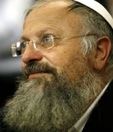
Anti-Arab Rabbi Shmuel Eliyahu incited on his Facebook page to kill Palestinians saying “Israeli government has to set a law to eliminate Palestinian fighters.”
This came in Eliyahu’s Answer to a journalist’s question on whether Palestinians who carry out resistance operations should be detained and released later on or should be killed.
Eliyahu added “If you are certain that he constitutes a real risk, you should leave him live and interrogate him strongly, then send him to hell. A policeman who lets terrorists live must be held accountable.”
Since October the first, clashes have been flaring up in the West Bank and Occupied Jerusalem and recently in the Gaza Strip for the defense of the Aqsa Mosque and the holy city of Jerusalem.
17 Palestinians have been killed whereas hundreds got injured in the clashes. However, Palestinian youths carried out stabbing operations against Israeli settlers and soldiers.
This came in Eliyahu’s Answer to a journalist’s question on whether Palestinians who carry out resistance operations should be detained and released later on or should be killed.
Eliyahu added “If you are certain that he constitutes a real risk, you should leave him live and interrogate him strongly, then send him to hell. A policeman who lets terrorists live must be held accountable.”
Since October the first, clashes have been flaring up in the West Bank and Occupied Jerusalem and recently in the Gaza Strip for the defense of the Aqsa Mosque and the holy city of Jerusalem.
17 Palestinians have been killed whereas hundreds got injured in the clashes. However, Palestinian youths carried out stabbing operations against Israeli settlers and soldiers.
24 aug 2015
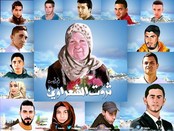
Rabbi Yisrael Ariel
Following the administrative detentions of right wing radicals, the new Sanhedrin issued a statement of support of the radical right wing for 'risking their lives for the holiness of the nation and the Land.'
The new Sanhedrin movement – an organization that seeks to restore rabbinical law in Israel – provided support to the e11 right-wing extremists recently slapped with restraining orders, Ynet learned Monday.
"We are happy that you pose as an example and inspiration to religious judges and all of the loyal people of Israel," the movement wrote to the "hilltop youth" (a general term for radicals living in West Bank outposts).
The new Sanhedrin movement, which is popular among the hilltop youth, includes a group of rabbis from the religious-Zionist and the Haredi-Zionist sectors.
Even though it is not recognized by the Chief Rabbinate, the movement, which was founded in 2005, succeeded in drawing in many supporters among the Religious Zionists, particularly haredi Zionists.
Until 2008, it was headed by Rabbi Adin Steinsaltz, who was awarded the Israel Prize for Jewish studies in 1988, and honored by then-president Shimon Peres with Israel's first President's Prize for his scholarship in Talmud.
After Rabbi Steinsaltz resigned, more and more members of the hilltop youth and right-wing extremists were drawn to the movement.
Following the administrative detentions of right wing radicals, the new Sanhedrin issued a statement of support of the radical right wing for 'risking their lives for the holiness of the nation and the Land.'
The new Sanhedrin movement – an organization that seeks to restore rabbinical law in Israel – provided support to the e11 right-wing extremists recently slapped with restraining orders, Ynet learned Monday.
"We are happy that you pose as an example and inspiration to religious judges and all of the loyal people of Israel," the movement wrote to the "hilltop youth" (a general term for radicals living in West Bank outposts).
The new Sanhedrin movement, which is popular among the hilltop youth, includes a group of rabbis from the religious-Zionist and the Haredi-Zionist sectors.
Even though it is not recognized by the Chief Rabbinate, the movement, which was founded in 2005, succeeded in drawing in many supporters among the Religious Zionists, particularly haredi Zionists.
Until 2008, it was headed by Rabbi Adin Steinsaltz, who was awarded the Israel Prize for Jewish studies in 1988, and honored by then-president Shimon Peres with Israel's first President's Prize for his scholarship in Talmud.
After Rabbi Steinsaltz resigned, more and more members of the hilltop youth and right-wing extremists were drawn to the movement.
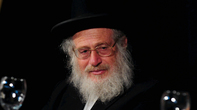
Rabbi Yoel Schwartz
After the evacuation of the outpost of Havat Gilad in 2011, the new Sanhedrin issued a halachic ruling encouraging settlers to attack security forces who came to evacuate the outpost.
"It is a Biblical obligation for every person in Israel to adhere to the Land of Israel, and resist any attempt at displacement with the willingness to give up your life, just as one does when confronted by a non-Jew," they wrote at the time.
Following the administrative detentions of several right wing extremists and the restraining orders imposed on several others, the new Sanhedrin issued a statement of support in the radical right wing.
"The Sanhedrin court, which sits on Mount Zion in holy Jerusalem, hereby strengthens your spirits and reduces your sorrow, as you were seized while acting for the respect of God and the nation of Israel, risking your lives for the holiness of the nation and the Land," Rabbis Yisrael Ariel, Daniel Cohen and Yoel Schwartz wrote.
The rabbis who signed the statement are considered very extreme in their views, but they nonetheless receive the support of religious Zionists. Rabbi Ariel, head of the Temple Institute, was formerly on the Kach Knesset list.
Rabbi Hacohen Stavski is considered one of the most extreme Chabad rabbis, and Rabbi Schwartz was banished from his community in Mea Shearim in Jerusalem after initiating the drafting of Haredim into the Nahal Haredi battalion.
"Be strong and courageous, you and your families, in the face of persecutions and harassments. You are blessed for being caught while engaged in your relentless and uncompromising struggle for the sake of the conquest and inheritance of Israel as per the Torah and as a mitzva," the rabbis wrote.
"The Tribunal will endeavor to address each and every file with reference to the fearful state in which dozens of Israeli civilians are detained and interrogated, in arrests of a racist nature, administrative detention without any charges, evidence and proof."
After the evacuation of the outpost of Havat Gilad in 2011, the new Sanhedrin issued a halachic ruling encouraging settlers to attack security forces who came to evacuate the outpost.
"It is a Biblical obligation for every person in Israel to adhere to the Land of Israel, and resist any attempt at displacement with the willingness to give up your life, just as one does when confronted by a non-Jew," they wrote at the time.
Following the administrative detentions of several right wing extremists and the restraining orders imposed on several others, the new Sanhedrin issued a statement of support in the radical right wing.
"The Sanhedrin court, which sits on Mount Zion in holy Jerusalem, hereby strengthens your spirits and reduces your sorrow, as you were seized while acting for the respect of God and the nation of Israel, risking your lives for the holiness of the nation and the Land," Rabbis Yisrael Ariel, Daniel Cohen and Yoel Schwartz wrote.
The rabbis who signed the statement are considered very extreme in their views, but they nonetheless receive the support of religious Zionists. Rabbi Ariel, head of the Temple Institute, was formerly on the Kach Knesset list.
Rabbi Hacohen Stavski is considered one of the most extreme Chabad rabbis, and Rabbi Schwartz was banished from his community in Mea Shearim in Jerusalem after initiating the drafting of Haredim into the Nahal Haredi battalion.
"Be strong and courageous, you and your families, in the face of persecutions and harassments. You are blessed for being caught while engaged in your relentless and uncompromising struggle for the sake of the conquest and inheritance of Israel as per the Torah and as a mitzva," the rabbis wrote.
"The Tribunal will endeavor to address each and every file with reference to the fearful state in which dozens of Israeli civilians are detained and interrogated, in arrests of a racist nature, administrative detention without any charges, evidence and proof."
12 aug 2015
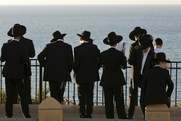
A group of Israeli rabbis has launched a movement of conversion courts challenging the ultra-Orthodox establishment's monopoly on conversions to Judaism, organizers said Tuesday.
The move is being seen as a serious challenge to ultra-Orthodox control over key aspects of Israeli life. The new conversion courts now join the debate in Israel over who can be converted to Judaism and how. An initial conversion of six children, not authorized by the chief rabbinate, took place on Monday.
And while the conversions are not expected to be recognized officially, organizers of the new movement hope that pressure on the government will increase as more people take part. "The idea is to create a more moderate, open conversion system which is more connected to Israeli society and realizes the Zionist dream of Jews coming from all around the world," said Elad Caplan of ITIM, one of the organisations behind the initiative.
Media reports spoke of a serious challenge to the ultra-Orthodox establishment, with Haaretz newspaper calling it "the first act of mutiny against the chief rabbinate's restrictive control over the conversion process." The new conversion courts, which include 12 rabbis, allow for a simpler process that organizers say will make it easier for immigrants.
They also say it will allow those who consider themselves Jews culturally, but who have been unable to convert officially, to do so. The current process is stringent, requiring a commitment to a strict, religious way of life.
Potential converts also face difficulties including demonstrating lineage, such as proving that one's mother was Jewish. Some 364,000 Israelis of Jewish ancestry -- mostly immigrants from the former Soviet Union -- are not considered Jewish and are defined as "religionless."
Israel also does not allow civil or interfaith weddings, meaning that those considered "religionless" cannot marry in Israel. The challenge to the religious establishment comes after ministers last month struck down a bill that would have overturned the chief rabbinate's monopoly on conversions.
Rejecting the bill was a condition of the ultra-Orthodox party Shas for joining Prime Minister Benjamin Netanyahu's coalition government. Netanyahu has a majority of just one seat in parliament.
Opponents reject the conversion movement and say it could lead to a dilution of the Jewish community. A spokesman for the chief rabbinate declined comment when contacted by AFP Tuesday.
However, a former spokesman said he strongly opposed the initiative, saying it would "open the door for assimilation." "The Jewish state has responsibility not only for its current citizens, but also the historical phenomenon regarding the Jewish nation," Ziv Maor told AFP.
The move is being seen as a serious challenge to ultra-Orthodox control over key aspects of Israeli life. The new conversion courts now join the debate in Israel over who can be converted to Judaism and how. An initial conversion of six children, not authorized by the chief rabbinate, took place on Monday.
And while the conversions are not expected to be recognized officially, organizers of the new movement hope that pressure on the government will increase as more people take part. "The idea is to create a more moderate, open conversion system which is more connected to Israeli society and realizes the Zionist dream of Jews coming from all around the world," said Elad Caplan of ITIM, one of the organisations behind the initiative.
Media reports spoke of a serious challenge to the ultra-Orthodox establishment, with Haaretz newspaper calling it "the first act of mutiny against the chief rabbinate's restrictive control over the conversion process." The new conversion courts, which include 12 rabbis, allow for a simpler process that organizers say will make it easier for immigrants.
They also say it will allow those who consider themselves Jews culturally, but who have been unable to convert officially, to do so. The current process is stringent, requiring a commitment to a strict, religious way of life.
Potential converts also face difficulties including demonstrating lineage, such as proving that one's mother was Jewish. Some 364,000 Israelis of Jewish ancestry -- mostly immigrants from the former Soviet Union -- are not considered Jewish and are defined as "religionless."
Israel also does not allow civil or interfaith weddings, meaning that those considered "religionless" cannot marry in Israel. The challenge to the religious establishment comes after ministers last month struck down a bill that would have overturned the chief rabbinate's monopoly on conversions.
Rejecting the bill was a condition of the ultra-Orthodox party Shas for joining Prime Minister Benjamin Netanyahu's coalition government. Netanyahu has a majority of just one seat in parliament.
Opponents reject the conversion movement and say it could lead to a dilution of the Jewish community. A spokesman for the chief rabbinate declined comment when contacted by AFP Tuesday.
However, a former spokesman said he strongly opposed the initiative, saying it would "open the door for assimilation." "The Jewish state has responsibility not only for its current citizens, but also the historical phenomenon regarding the Jewish nation," Ziv Maor told AFP.
25 july 2015
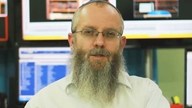
A prosecutor's declaration was filed on Friday to the Nazareth Magistrate's Court against Israeli rabbi Ezra Sheinberg from Safed city after dozens of women have filed complaints of sexual abuses.
The court ruled for the extension of Sheinberg's remand pending further investigation. An indictment against Sheinberg is expected to be filed in the Nazareth District Court next week.
Israeli media outlets said Sheinberg was arrested while trying to flee Israel at Ben-Gurion Airport earlier this month.
Over the past few years, scores of women have publicly spoken about the abuse they suffered, with many providing testimonies and affidavits on being molested by Israeli army and police officers against their will.
The court ruled for the extension of Sheinberg's remand pending further investigation. An indictment against Sheinberg is expected to be filed in the Nazareth District Court next week.
Israeli media outlets said Sheinberg was arrested while trying to flee Israel at Ben-Gurion Airport earlier this month.
Over the past few years, scores of women have publicly spoken about the abuse they suffered, with many providing testimonies and affidavits on being molested by Israeli army and police officers against their will.
19 july 2015
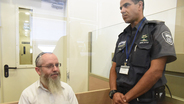
Rabbi Scheinberg
Kabbalist Rabbi Ezra Scheinberg, who founded a yeshiva and a devoted community in Safed and became famous across Israel for his alleged supernatural powers, tries to flee the country following suspicions that he raped and molested 10 women who sought his advice.
Kabbalist Rabbi Ezra Scheinberg, head of the Orot HaAri community and yeshiva in the northern city of Safed, is suspected of committing sexual offenses on women who arrived to consult him, the Supreme Court cleared for publication last week.
Ten women have filed complaint against Scheinberg so far. The 47-year-rabbi's remand was extended by eight days last Wednesday.
In addition to his arrest, Rabbi Scheinberg was also suspended from the yeshiva and removed from his city at the decision of several rabbis, led by Safed's Chief Rabbi Shmuel Eliyahu. Before he was arrested, the rabbi allegedly tried to escape abroad but was detained at Ben-Gurion Airport.
He was taken in for questioning by the Safed Police, which have already received 10 complaints against him from women who were allegedly raped and molested by him.
The Orot HaAri students are still shocked by the arrest and suspicions against their former yeshiva head and are finding it difficult to accept that the great kabbalist, who many of them had asked for advice and for blessings, is now being portrayed as a sex offender.
A huge trash can has been placed in one of the rooms in the yeshiva, and all of Rabbi Scheinberg's writings and books have been tossed in it. "From here they will be archived and buried. Rabbi Scheinberg has become an abomination in the eyes of the students," said Gad Cohen, a rabbi and teacher at the yeshiva who had worked with Scheinberg for seven years.
Rabbi Scheinberg is married and has eight children and grandchildren. He was considered one of the rising powers in Religious Zionism involved in the Jewish mystical doctrine of Kabbalah and a dominant rabbinical figure in the national-religious public in northern Israel.
Scheinberg grew up in Jerusalem and studied in the prestigious Netiv Meir high school yeshiva and at the Kiryat Shmona Hesder Yeshiva. He also served in the IDF Armored Corps. He continued his rabbinical studies and was affiliated with famous rabbis. In the past 15 years, he became famous as a "scholar" who teaches Torah and as a "righteous man" with spiritual supernatural powers. Despite his young age, he gained the support of community leaders and founded a successful yeshiva with Hasidic elements with their approval and authorization, surrounded by a devoted community.
Scheinberg attracted men and women from across the country, both religious and secular, who sought his blessing or advice about a name for their newborn or shared intimate details with him so that he could help them find a match, conceive or settle a marital dispute. The rabbi had a lot of power over his community members, and his followers accepted his requests and demands.
Scheinberg was considered the protégé of former Chief Rabbi Mordechai Eliyahu, who was one of the leaders of Religious Zionism. Scheinberg's power increased after Eliyahu's death in 2010, and many of the late rabbi's followers began following him.
Over the years, a devoted flock developed around him. The yeshiva and the kollel (an advanced Jewish studies program for married men) which he founded in Safed include about 100 students and his community is made up of some 40 families. The wider circles includes many other followers across the country who have heard about his virtues and sought to study with him.
As Scheinberg's activity was based in Safed, he developed close ties with the city's chief rabbi, Shmuel Eliyahu, who is considered the supreme spiritual figure in the yeshiva's community.
Scheinberg was arrested last Wednesday at Ben-Gurion Airport while attempting to leave Israel. It happened after his students accepted – almost indisputably – the ruling delivered by the court established by Rabbi Eliyahu, that Scheinberg had hurt women and must leave the community.
A., one of Scheinberg's students who kept in touch with him even after he graduated from the yeshiva says that "there was an aura around him of a kabbalist rabbi who does wonders. We saw a person arriving at the yeshiva on the dot, studying and giving lessons. He was attentive to hundreds of appeals on a daily basis and was ready to listen to people.
"We mainly saw a rabbi who was valued by the greatest rabbis and appreciated by the public. There is a gap between the person we knew and the suspicions which is hard to comprehend. After we realized what happened, we all renounced this rabbi as one. There is no one who wants to defend him. There is no one who denies it. On the contrary."
'Warn the public against him'
Kabbalist Rabbi Ezra Scheinberg, who founded a yeshiva and a devoted community in Safed and became famous across Israel for his alleged supernatural powers, tries to flee the country following suspicions that he raped and molested 10 women who sought his advice.
Kabbalist Rabbi Ezra Scheinberg, head of the Orot HaAri community and yeshiva in the northern city of Safed, is suspected of committing sexual offenses on women who arrived to consult him, the Supreme Court cleared for publication last week.
Ten women have filed complaint against Scheinberg so far. The 47-year-rabbi's remand was extended by eight days last Wednesday.
In addition to his arrest, Rabbi Scheinberg was also suspended from the yeshiva and removed from his city at the decision of several rabbis, led by Safed's Chief Rabbi Shmuel Eliyahu. Before he was arrested, the rabbi allegedly tried to escape abroad but was detained at Ben-Gurion Airport.
He was taken in for questioning by the Safed Police, which have already received 10 complaints against him from women who were allegedly raped and molested by him.
The Orot HaAri students are still shocked by the arrest and suspicions against their former yeshiva head and are finding it difficult to accept that the great kabbalist, who many of them had asked for advice and for blessings, is now being portrayed as a sex offender.
A huge trash can has been placed in one of the rooms in the yeshiva, and all of Rabbi Scheinberg's writings and books have been tossed in it. "From here they will be archived and buried. Rabbi Scheinberg has become an abomination in the eyes of the students," said Gad Cohen, a rabbi and teacher at the yeshiva who had worked with Scheinberg for seven years.
Rabbi Scheinberg is married and has eight children and grandchildren. He was considered one of the rising powers in Religious Zionism involved in the Jewish mystical doctrine of Kabbalah and a dominant rabbinical figure in the national-religious public in northern Israel.
Scheinberg grew up in Jerusalem and studied in the prestigious Netiv Meir high school yeshiva and at the Kiryat Shmona Hesder Yeshiva. He also served in the IDF Armored Corps. He continued his rabbinical studies and was affiliated with famous rabbis. In the past 15 years, he became famous as a "scholar" who teaches Torah and as a "righteous man" with spiritual supernatural powers. Despite his young age, he gained the support of community leaders and founded a successful yeshiva with Hasidic elements with their approval and authorization, surrounded by a devoted community.
Scheinberg attracted men and women from across the country, both religious and secular, who sought his blessing or advice about a name for their newborn or shared intimate details with him so that he could help them find a match, conceive or settle a marital dispute. The rabbi had a lot of power over his community members, and his followers accepted his requests and demands.
Scheinberg was considered the protégé of former Chief Rabbi Mordechai Eliyahu, who was one of the leaders of Religious Zionism. Scheinberg's power increased after Eliyahu's death in 2010, and many of the late rabbi's followers began following him.
Over the years, a devoted flock developed around him. The yeshiva and the kollel (an advanced Jewish studies program for married men) which he founded in Safed include about 100 students and his community is made up of some 40 families. The wider circles includes many other followers across the country who have heard about his virtues and sought to study with him.
As Scheinberg's activity was based in Safed, he developed close ties with the city's chief rabbi, Shmuel Eliyahu, who is considered the supreme spiritual figure in the yeshiva's community.
Scheinberg was arrested last Wednesday at Ben-Gurion Airport while attempting to leave Israel. It happened after his students accepted – almost indisputably – the ruling delivered by the court established by Rabbi Eliyahu, that Scheinberg had hurt women and must leave the community.
A., one of Scheinberg's students who kept in touch with him even after he graduated from the yeshiva says that "there was an aura around him of a kabbalist rabbi who does wonders. We saw a person arriving at the yeshiva on the dot, studying and giving lessons. He was attentive to hundreds of appeals on a daily basis and was ready to listen to people.
"We mainly saw a rabbi who was valued by the greatest rabbis and appreciated by the public. There is a gap between the person we knew and the suspicions which is hard to comprehend. After we realized what happened, we all renounced this rabbi as one. There is no one who wants to defend him. There is no one who denies it. On the contrary."
'Warn the public against him'
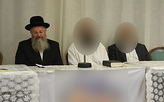
Rabbi Shmuel Eliyahu
Judge Uri Shoham decided to clear the rabbi's name for publication in order to "encourage other complainants, who have requested not to expose themselves until now, to testify about what the suspect did to theme. There is also room to warn the public against him."
The judge further wrote, "As for the damage which the suspect may suffer from the publication, including his medical and personal situation, I found that it is not enough to prevent the publication of his name. The damages the suspect points to are no different from the damages of any person subject to a criminal investigation for serious offenses like these, and it makes no difference that the suspect is a famous person whose identity is known by his community members."
Rabbi Eliyahu said after the affair was revealed, "It's a damaging attack. The rabbi is evil. At first we thought that his actions were simply a moral breakdown and had no criminal aspects, and we suggested that he stay away from the public. He accepted all the conditions, but didn't fulfill them. He continued talking to students and justifying his corrupt actions.
"We removed him from the city, and that gave the first woman the courage to complain after keeping the pain in her heart for 13 years. She was then followed by all the others." Rabbi Eliyahu added during a meeting with rabbis and yeshiva students, "We are guilty.
One of the women who complained was hurt 13 years ago, but refused to talk. She didn't think anyone would believe her. Only now, when the matter was raised, she felt she could complain. "It's time to be more sensitive and attentive to the cry of humiliated women. If we improve in this area, we may be able to prevent the next damaging attack."
The rabbi said that when the suspicions against the Scheinberg were exposed, women fainted and yeshiva students tore their clothes. "I have met broken hearts across the country. We are experiencing a difficult crisis," he added. Rabbi Scheinberg's student added, "We are crying. We have not eaten or slept for several days now. It's inconceivable. It's a shock, a horror. It's very difficult for anyone who saw this man as his rabbi, but luckily, our faith in God and in the Torah don't depend on him."
Judge Uri Shoham decided to clear the rabbi's name for publication in order to "encourage other complainants, who have requested not to expose themselves until now, to testify about what the suspect did to theme. There is also room to warn the public against him."
The judge further wrote, "As for the damage which the suspect may suffer from the publication, including his medical and personal situation, I found that it is not enough to prevent the publication of his name. The damages the suspect points to are no different from the damages of any person subject to a criminal investigation for serious offenses like these, and it makes no difference that the suspect is a famous person whose identity is known by his community members."
Rabbi Eliyahu said after the affair was revealed, "It's a damaging attack. The rabbi is evil. At first we thought that his actions were simply a moral breakdown and had no criminal aspects, and we suggested that he stay away from the public. He accepted all the conditions, but didn't fulfill them. He continued talking to students and justifying his corrupt actions.
"We removed him from the city, and that gave the first woman the courage to complain after keeping the pain in her heart for 13 years. She was then followed by all the others." Rabbi Eliyahu added during a meeting with rabbis and yeshiva students, "We are guilty.
One of the women who complained was hurt 13 years ago, but refused to talk. She didn't think anyone would believe her. Only now, when the matter was raised, she felt she could complain. "It's time to be more sensitive and attentive to the cry of humiliated women. If we improve in this area, we may be able to prevent the next damaging attack."
The rabbi said that when the suspicions against the Scheinberg were exposed, women fainted and yeshiva students tore their clothes. "I have met broken hearts across the country. We are experiencing a difficult crisis," he added. Rabbi Scheinberg's student added, "We are crying. We have not eaten or slept for several days now. It's inconceivable. It's a shock, a horror. It's very difficult for anyone who saw this man as his rabbi, but luckily, our faith in God and in the Torah don't depend on him."
Page: 2 - 1
